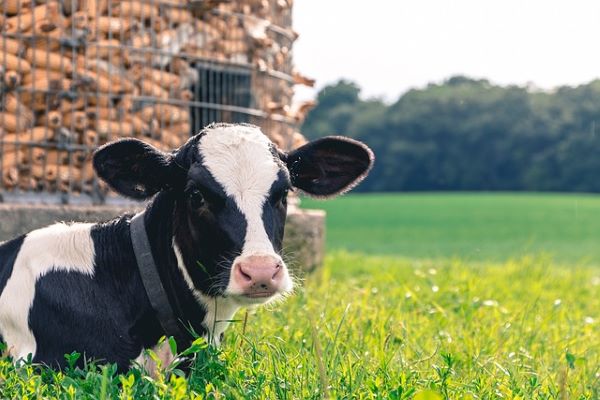Johne’s Disease (pronounced “Yo-nees”) is a chronic, contagious bacterial infection that affects the intestines of dairy cows and other ruminants. It is caused by Mycobacterium avium subspecies paratuberculosis (MAP), leading to severe inflammation of the intestinal walls. Johne’s Disease is economically devastating to dairy farmers due to the long-term impacts on herd productivity and animal health. Understanding the disease, its transmission, symptoms, prevention, and treatment is critical for the effective management of dairy herds. (Source)
How Johne’s Disease is Spread
Johne’s Disease is primarily spread through:
- Fecal-Oral Transmission: Infected cows shed the MAP bacteria in their feces, contaminating water, feed, and the environment. Healthy cows ingest these contaminated materials, becoming infected.
- Vertical Transmission: Pregnant cows can pass the infection to their calves in utero or through contaminated colostrum and milk.
- Human Activity: Farm workers may inadvertently spread the bacteria through equipment, feeding tools, or by moving contaminated manure. (Source)
Transmission of Johne’s Disease
The transmission of Johne’s Disease is primarily through contaminated manure or milk, especially from infected adult cows to newborn calves. The bacteria may be ingested from contaminated pasture, feed, or water sources.
Symptoms of Johne’s Disease
The symptoms of Johne’s Disease often appear after a long incubation period. Infected cows can remain asymptomatic for years, which makes detection challenging. Common clinical symptoms include:
- Chronic Diarrhea: Watery, persistent diarrhea is a hallmark of Johne’s Disease.
- Weight Loss: Despite a normal or increased appetite, infected cows experience significant weight loss.
- Decreased Milk Production: Infected dairy cows show reduced milk yield, negatively impacting farm productivity.
- Depression and Lethargy: As the disease progresses, the cow may become weak and lethargic. (Source)
Causes of Johne’s Disease
Johne’s Disease is caused by the bacterium Mycobacterium avium subspecies paratuberculosis (MAP). This bacterium infects the intestines of cattle, causing inflammation and impairing the animal’s ability to absorb nutrients.
Who is Vulnerable?
All cattle are susceptible to Johne’s Disease, but specific groups are more vulnerable:
- Calves: Young calves (especially those under six months) are at the highest risk of infection, primarily through exposure to contaminated feces, milk, or colostrum.
- Stressed Animals: Cows experiencing stress due to poor nutrition, overcrowding, or other diseases are more vulnerable to developing clinical signs.
- High-Density Herds: Dairy operations with a large number of cows in confined spaces are at greater risk due to the increased likelihood of fecal contamination.
- Herds with Poor Sanitation: Inadequate manure management and dirty conditions increase the risk of transmission. (Source)
Problems Caused by Johne’s Disease
It leads to numerous problems within a dairy herd:
- Economic Losses: Reduced milk production, increased culling, and veterinary costs significantly impact the farm’s profitability.
- Reproductive Issues: Infected cows may experience infertility and reduced reproductive performance.
- Welfare Concerns: The chronic nature of the disease leads to suffering in affected animals, with poor body condition and constant diarrhea.
- Increased Culling: Infected cows are often culled due to poor performance, leading to the need for replacements. (Source)
Treatment of Johne’s Disease
Currently, there is no cure for it. Treatment is focused on controlling the spread and managing affected cows:
- Antibiotics: While antibiotics can be used to treat some bacterial infections, they are not effective against Johne’s Disease.
- Supportive Care: Provide affected cows with high-quality nutrition and supportive care to maintain their weight and hydration.
- Early Culling: Infected cows are often culled to prevent further spread and manage herd health.
Vaccines for Johne’s Disease
Currently, there is no widely available vaccine for this Disease. Some countries have experimental vaccines, but they are not always effective in controlling the disease. Preventive strategies, including strict biosecurity and herd management, remain the best approach for minimizing the impact of Johne’s Disease. (Source)
Prevention of Johne’s Disease
Preventing it requires rigorous management practices, including:
- Good Sanitation: Maintain clean, dry living conditions for dairy cows, with regular removal of manure to reduce environmental contamination.
- Test and Cull: Regularly test the herd for Johne’s Disease and cull infected animals to prevent spread.
- Proper Calf Management: Calves should be born in clean environments and fed uncontaminated colostrum from uninfected cows. Separate calves from adult cows to reduce their exposure to MAP.
- Feed and Water Hygiene: Ensure that feed and water are not contaminated with manure. (Source)
Home Remedies for Johne’s Disease
While home remedies cannot cure it, supportive measures can help improve an infected cow’s condition:
- Hydration: Ensure cows have access to fresh, clean water at all times.
- Nutrient-Dense Feed: Providing high-quality, nutrient-dense feed can help maintain body condition and reduce the severity of weight loss.
How Humans Can Protect Their Dairy Cows
Farmers and dairy operators can take several steps to protect their herds from this Disease:
- Test Regularly: Implement a regular testing program to identify infected cows early and prevent further transmission.
- Maintain Hygiene: Keep barns and feeding areas clean to minimize the risk of environmental contamination.
- Manage Calf Nutrition: Feed calves clean, uncontaminated colostrum, and house them separately from adult cows.
- Implement Biosecurity: Prevent the introduction of infected animals into the herd by sourcing new cows from Johne ’s-free farms. (Source)
What Global Organizations and Experts Say
The World Organisation for Animal Health (OIE) emphasizes the importance of this prevention through herd management and biosecurity measures. According to the USDA, regular testing and culling of infected animals are critical for controlling the disease.
Also, watch web stories: 7 Cat Care Tips for Beginners
Conclusion
It is a significant concern for dairy farmers due to its chronic nature and economic impact. The disease spreads through fecal-oral transmission and can affect any cattle herd, especially young calves.





